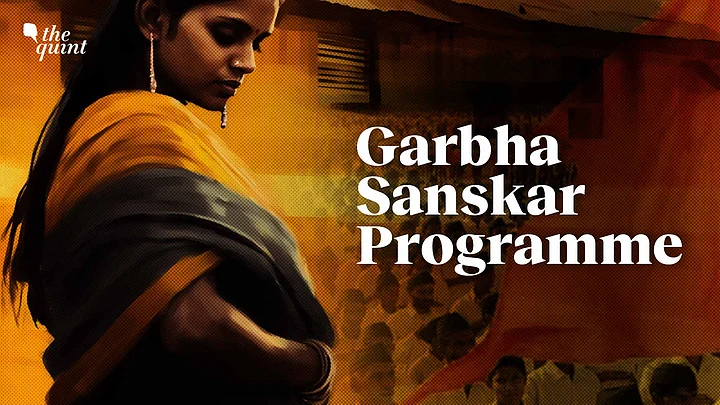"Every child taking birth, be it a boy or a girl, should come with good sanskar, good thoughts, and be a deshbhakt (patriot)," a senior functionary of an RSS-affiliated body, Samvardhinee Nyas, said at the launch of a programme aimed at India's pregnant women.
Called 'Garbha Sanskar', the idea behind the campaign is to encourage women to read Hindu religious texts like Ramayana and Bhagavad Gita, practise yoga, and chant mantras in Sanskrit during their pregnancy.
While any country could certainly benefit from having citizens with 'good thoughts', some key issues get missed out in the context of such campaigns.
Can Foetuses Really Understand You?
The foetus in the womb does not actually understand words because its brain has not had the opportunity to develop enough to make sense of language. All of that will happen after a child is born, and in fact, it takes about a year or more before words start to have meaning.
We hear something through our ears and make sense of what we hear in our brains. That is listening. Without adequate brain development, what we hear is basically just sound or vibrations.
At four months, the foetal brain is not developed in a way that one can really communicate with it. If you make a loud sound next to a pregnant person's stomach, the foetus will get startled – but that is more of a reflex.
Ensure Health of Pregnant Person First
Moving on, while it is important that there are measures to improve the health of a wanted pregnancy and subsequently, of the child that will be born, it would be even better if we, as a nation, could pay attention to pregnant women.
Currently, the status of women in our country is so dismal that:
India ranks 135 out of 146 in the global gender gap index. In the health and survival subheading, it ranks at the bottom – 146th. We are behind almost all our neighbouring countries, and just barely ahead of Afghanistan and Iran in terms of how we treat women.
Child marriages are still taking place, and almost one-third of all marriages involve a girl child under the legal age of 18.
About 58% of pregnant women in India are anaemic and it is estimated that anaemia is the underlying cause of 20-40% of cases of maternal deaths, as per a study.
India ranks second in the top 5 in the highest maternal mortality rates in the world.
Over 6,000 women die every year due to dowry deaths – when dowry is, in fact, illegal in the country.
Millions of women suffer from these issues related to health caused by a lack of systemic investment – but also as a result of their secondary status in our patriarchal society.
Women are expected to eat least and eat last while the high protein, nutrient-rich diet is usually reserved for the men in the family – as women's unpaid domestic labour, childbearing, child-rearing, and caregiving contributions are not considered legitimate work.
Women have less access to health information and health facilities and often cannot even negotiate their own health as a priority within their own families.
So, while we should certainly hope for better health and well-being of future generations, what we should ideally be focusing on is the pregnant person's health and well-being.
Is she getting enough rest? Is she getting nutritious meals? Is she being treated with respect and dignity? Is the family caring for her health and ensuring regular clinic visits? Is she in a happy frame of mind?
There is a pandemic of violence against women in India – and pregnant women are not immune to it. Domestic violence and cruelty by the husband and relatives continue to be the highest reported crime while keeping in mind that a majority of cases do not even get reported.
A 2021 study, based on National Family Health Survey-4 data, points out that the physical and sexual violence experienced by women can be associated with unwanted pregnancies, abortion, and miscarriages.
An unsafe environment of stress, abuse, and violence would naturally create stress hormones in the pregnant person's body. What would really help the child grow up to be happy and healthy is if the mother is happy and healthy.
Shifting Focus
My concern as a gynaecologist is that we are putting too much pressure on the woman by regulating the way she conducts herself during her pregnancy – and there is no enabling environment being created for her.
Yoga and spirituality are positive interventions for everyone. But rather than putting the emphasis only on sacred texts, it would be far better if the emphasis is on the immediate family treating the pregnant person as someone sacred and ensuring her mental, emotional, and physical well-being so that she can have a stress-free pregnancy.
This is the best way to ensure the well-being of the foetus and the newborn, and a healthy, happy next generation.
(Dr Suchitra Dalvie is a practising gynaecologist and India's first certified coach for Conscious Uncoupling, offering help and healing to those going through or planning a divorce or separation. She is also the co-founder and coordinator of the Asia Safe Abortion Partnership. This is an opinion piece and the views expressed above are the author's own. The Quint neither endorses nor is responsible for them.)
(As told to Meenakshy Sasikumar)
(At The Quint, we question everything. Play an active role in shaping our journalism by becoming a member today.)
